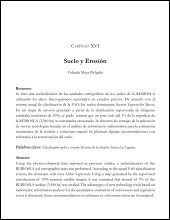Cambios en la estructura de la comunidad bacteriana en la rizósfera de mezquite amargo (Prosopis articulata S. Watson) por la inoculación con la bacteria promotora del crecimiento en plantas (PGPB) Bacillus pumilus ES4.
Resumen
Los desiertos cálidos son los ecosistemas más frágiles del planeta tierra, en los que cualquier pérdida o daño a su superficie vegetal contribuye a la degradación del suelo. Una alternativa para revertir los procesos de degradación del suelo es desarrollar programas de restauración de suelos degradados usando plantas nativas y Bacterias Promotoras del Crecimiento en Plantas (PGPB por sus siglas en ingles). Evaluaciones de la interacción planta-microorganismos se han realizado a lo largo de los años y han demostrado ser una herramienta importante para entender cómo las PGPB benefician a plantas nativas del desierto. Sin embargo, en la actualidad, no hay información sobre el efecto que se tiene por la inoculación de estas plantas sobre la comunidad nativa de bacterias de la rizósfera de plantas, dando como resultado un mejor crecimiento de las plantas y el desarrollo de la comunidad bacteriana asociada a la rizósfera. Para lograr elucidar esto se utilizaron técnicas moleculares (Reacción en Cadena de la Polimerasa (PCR) - Electroforesis de Geles con Gradiente Desnaturalizante(DGGE), Pirosecuenciación 454 e Hibridación Fluorescente in situ(FISH)), para conocer como la inoculación de la rizósfera de mezquite (Prosopis articulata), con Bacillus pumilus ES4 (bacteria endófita del cardón gigante (Pachycerus pringlei)) modifica la estructura de la comunidad bacteriana. Se encontró mediante los análisis de DGGE, que la comunidad nativa si cambia su estructura, debido a la inoculación de B. pumilus ES4, lo cual coincide con lo encontrado en los análisis de Pirosecuenciación del 16S rRNA, así mismo se logró ubicar la colonización del inoculante en la raíces de mezquite al utilizar las técnicas de Histología y FISH. Hot deserts are the most fragile ecosystems of the earth, where any loss or damage to your plant surface contributes to soil degradation. An alternative to reverse soil degradation processes is to develop programs to restore degraded soils using native plants and Plant Growth Promoting Bacteria (PGPB). Evaluations of plant-microorganism interaction have been done over the years and have proven to be important tool for understanding how PGPB benefit native desert plants. However, at present, no information on the effect it has of the inoculation of these plants on native community of bacteria in the rhizosphere of plants, resulting in improved plant growth and development of the bacterial community associated with the rhizosphere. To achieve elucidate this, molecular techniques were used (Polymerase chain reaction (PCR) - Electrophoresis Gels with Denaturing Gradient (DGGE), Pyrosequencing 454 and Fluorescent in situ Hybridization (FISH)), to meet the objective of this work. The goal was to see how the rhizosphere inoculation mesquite (Prosopis articulata) with Bacillus pumilus ES4 (endophytic bacteria giant cactus (Pachycerus pringlei)) modified the structure of the bacterial community. It was found by the analysis of DGGE, the native community by changed its structure, due to the inoculation of B. pumilus ES4, which coincides with the findings in the analysis of pyrosequencing of 16S rRNA, also was able to locate the colonization of inoculant in mesquite roots using Histology and FISH techniques.</dcterms:abstract>
<dc:subject xml:lang="es">Rizósfera; PGPB; PCR-DGGE; Pirosecuenciación 454 y FISH
Colecciones
Ítems relacionados
Mostrando ítems relacionados por Título, autor o materia.
-
PROMOCIÓN DEL PERIFITON PARA EL CULTIVO DE CAMARÓN BLANCO: HACIA UNA ACUICULTURA ECOLÓGICA
DOMENICO VOLTOLINA LOBINA; JUAN MANUEL AUDELO NARANJO; MARIA DEL ROSARIO PACHECO MARGES -
Suelo y Erosión
YOLANDA LOURDES MAYA DELGADO


